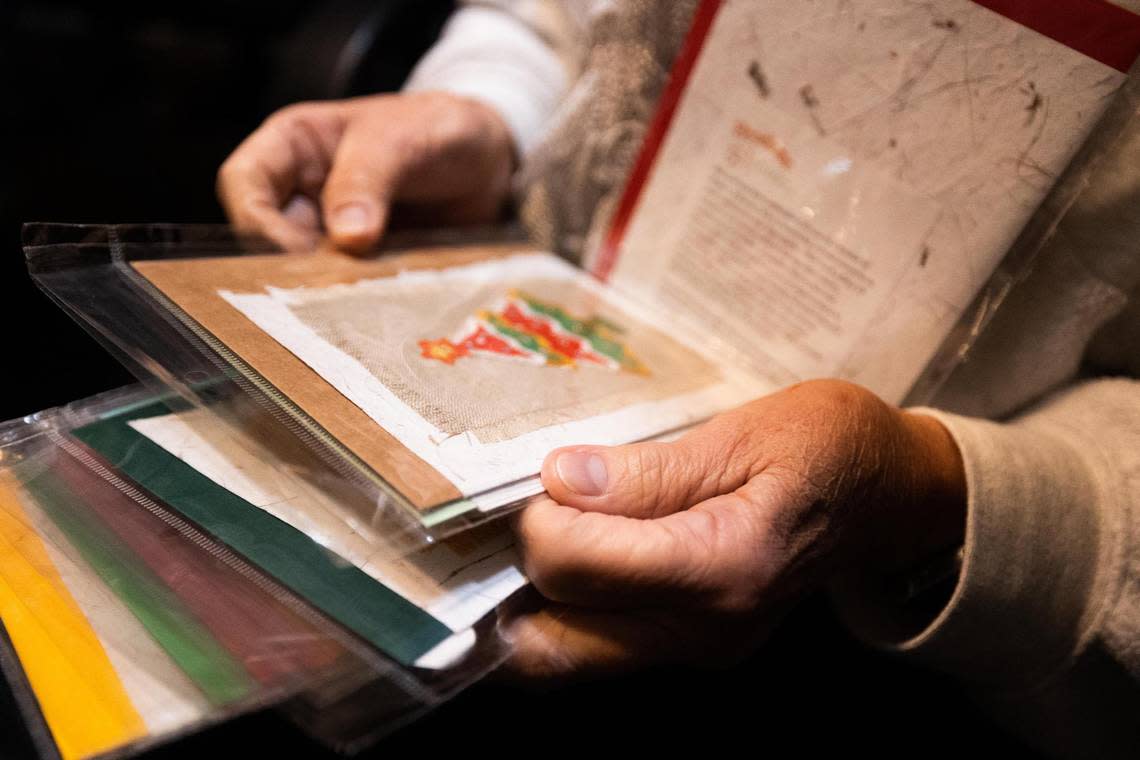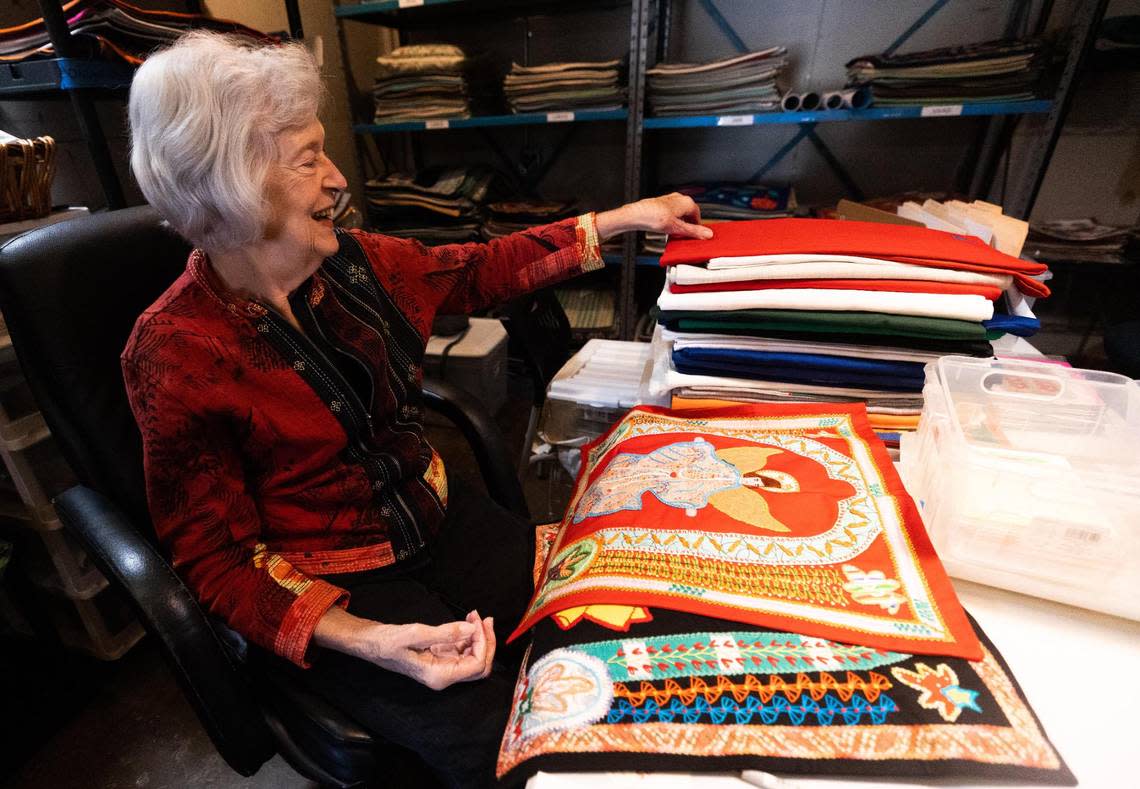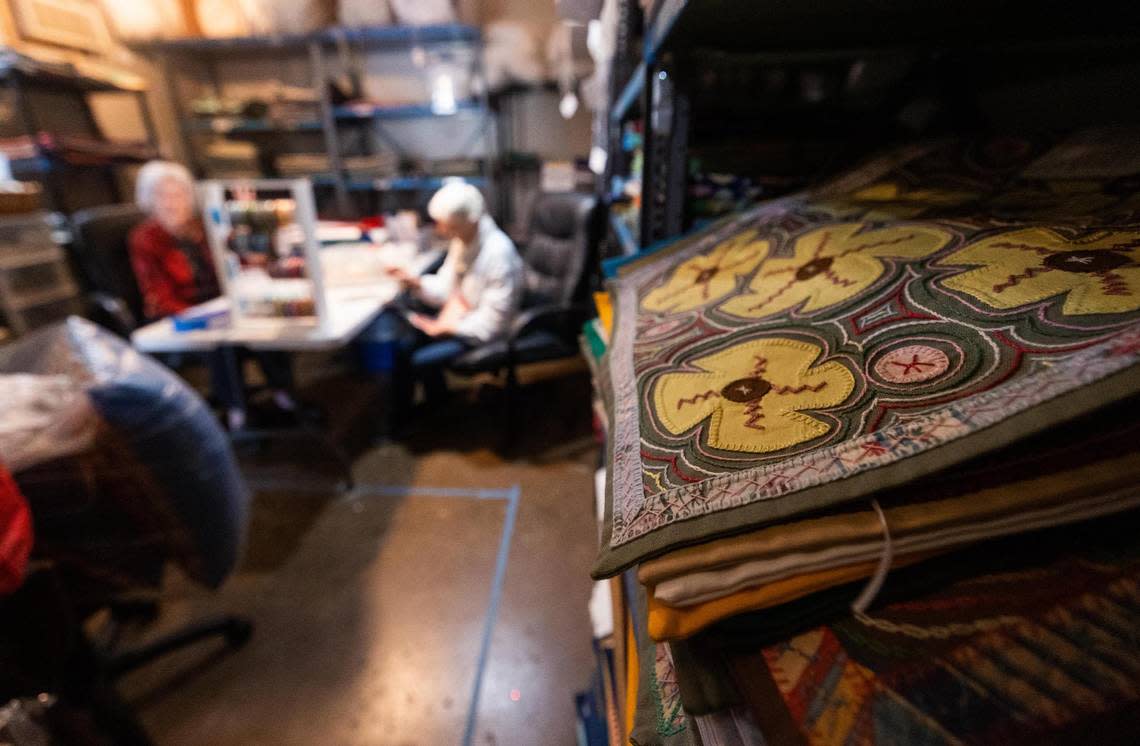Dallas sewing co-op gives women in Honduras opportunity to overcome gangs, drugs, poverty
On a Wednesday morning in late October, M’Lou Bancroft sits in a small storage room in Dallas surrounded by colorful pillow covers. She sorts through them in the dim light, trying to decide which ones would sell best over the Christmas season.
High shelves piled with embroidered place mats, table runners and more pillow covers line the walls. The intricate stitching looks like it came straight from a factory.
The sales won’t benefit M’Lou, though. All the proceeds will go to the women in southern Honduras who created the inventory with their needle and thread — by hand. M’Lou and her husband Bill Bancroft, the founders of the sewing co-op Honduras Threads, sell the items in North Texas and anywhere else they can find a market.

Honduras is a dangerous place to be a woman. At least 318 Honduran women died from violence in 2021, a result of a culture of gangs, drugs and machismo. The lack of good jobs and a 60% poverty rate makes it difficult for them to provide basic necessities for their families, a reason some of them undertake the difficult journey to the United States.
Bill Bancroft said the income the women earn from Honduras Threads changes the narrative for them. They can buy food and school supplies for their children without leaving their village. According to M’Lou, in the 20 years since Honduras Threads came into existence, none of the women or their immediate family members have tried to come to the U.S.
“The history of this organization has always been about creating jobs and income for these women, right?” Bill Bancroft said. “So If you have a job, if you have some income, then dignity and self respect, you know, follow.”
Humble beginnings
In 2001, the Bancrofts took a mission trip with the Episcopal Church of the Incarnation in Dallas to the rural Honduran village of Santa Cruz Arriba. As they got to know the women, they learned jobs were scarce. Many worked as live-in domestics for wealthy families in Tegucigalpa, a two to three hour bus ride away.
“They missed their kids desperately,” M’Lou Bancroft said. “And really, they only had Sunday afternoon with their kids, with their families.”
The Bancrofts, former Peace Corps volunteers in Bolivia, began searching for ways to help the women of Santa Cruz Arriba find work closer to home.
When they heard that all Honduran girls learn to embroider in elementary school and that a church in San Antonio hired a group of Honduran women to make banners and wall hangings, the idea for Honduras Threads was born.
When the first box of handicraft arrived from Honduras, M’Lou Bancroft said she wanted to cry. The colors didn’t match. The work was shoddy. The women only knew one embroidery stitch, and they didn’t follow the pattern.

Instead of giving up, she made another trip to Honduras and brought samples of what she wanted. The women were eager to learn, and gradually the work improved.
“They have come a long, long way,” M’Lou Bancroft said. “And now I couldn’t possibly do the stitches they do. They went way past me.”
The sewing co-op eventually expanded from Santa Cruz Arriba into other villages. There are 28 women from five rural communities embroidering for Honduras Threads.
In 2017 the organization became a social enterprise, a business recognized by the Honduran government and owned by the women.
Generational change
Sonia Nazario, a Pulitzer Prize-winning journalist and member of the Honduras Threads Advisory Board, said even though the sewing co-op is small, it’s having a positive impact on Honduran society.
Violence and poverty in Honduras drive many women to migrate to the United States in search of safety and a better income for their families. Even though it may bring short-term relief, Nazario said migration can be disastrous for family relationships.
“These kids say, you know, ‘You’re the person in the world who’s supposed to most love and protect me — my mother. And you walked away from me and you said you’d be back in one or two years but it took, you know, 10 or 15 years,’” Nazario said. “And even when these children reunify with their mothers, there’s deep resentment and even hatred toward their mothers for leaving them.”
Carolina Sagastume has worked with Honduras Threads for about 14 years. She joined because of her mother, who also embroiders for the co-op.
In a telephone interview from Honduras, Sagastume told the Star-Telegram in Spanish that she’s always enjoyed crafts like crochet and embroidery, and working with Honduras Threads has given her a chance to improve her skills and make beautiful things.
“One of the advantages we have working with the embroidery is we can work from home,” Sagastume said. “We can see our children and be available for them.”

The money Sagastume earns pays for transportation so her 12-year-old daughter doesn’t have to walk 45 minutes to school.
“For us, it’s been a blessing to have this work,” she said.
Seven women have worked with Honduras Threads from the start. Some of their children now work with Honduras Threads too. Others have gone to vocational school or university.
M’Lou Bancroft said the most fulfilling aspect of the co-op for her has been seeing the women blossom. They used to be quiet and reserved. Now they speak up with confidence, and the children are proud of their mothers’ work.
“They’re understanding that their mom is making something beautiful and earning money,” she said. “And that, in the macho kind of society they live in, is really, really great. And they really respect their moms’ abilities.”
Politicians keep trying to slow the flood of migrants from Honduras and other developing countries, but Nazario said experience shows hard-line immigration policies, like building a wall and separating families at the border, don’t work. At the same time, the needs that drive migration are real and need to be addressed.
“[Honduras Threads] is a pragmatic solution that actually works,” Nazario said. “And I’d love to see more churches, more people of faith step forward with these kinds of efforts.”
How to Help
Honduras Threads is always looking for volunteers to fill and ship orders, tag new items or sell the products at events and shows.
The organization is also seeking fabric donations that the Honduran women can use to make their products and monetary donations to cover the cost of sales and marketing.
If you want to purchase items that the women in Honduras have made, you can shop at the Honduras Threads online store.
